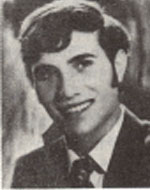Nitzachon, Shabtai
Shabtai, son of Sarah and Shlomo, was born on 16.6.1950 in Kfar Saba, where he completed his studies at the son of-Zvi elementary school and continued to study for a year in the “Amal” high school, Petah Tikva, with the aim of frameworks. Shabtai was an alert and intelligent student, blessed with intelligence and was loved by his teachers and classmates. He was a member of the Hanoar Haoved movement and participated in various activities. Even when he was a teenager, he had ambitions to move forward, so he decided to abandon his studies and develop his skills and ability at work. He was hired as a metalworker in the “metal” factory in Kfar Saba and worked there, to the satisfaction of the foremen, almost until his enlistment. The factory found an outlet for his creative impulse. Because he was well-liked, everyone liked him. None of his many acquaintances remembers that Shabtai ever raised his voice. He was a lover of music and film and devoted most of his leisure to his two hobbies: playing guitar and watching movies. He was very sociable, loved being with people-and they were looking for his closeness. Was a devoted son to his parents, respected them very much and tried to help them as much as he could. He also made strong connections with his brother and sister. Although he was not religious, he took care to eat kosher food and on Yom Kippur fasted and prayed in a synagogue. Prior to his induction into the Israel Defense Forces he underwent a military driving course, and Shabtai was drafted into the IDF in mid-May 1968 and assigned to the Armored Corps. After basic training, he successfully passed the tests for the half-track drivers, and as a result of his excellence he became a half-tracks instructor at the Armored Corps School. He was an excellent guide and served as an example to his friends and students in his good temper, passivity and courage. As a half-track driver, he participated in the IDF armored raid on the terrorist bases in Jordan, in the Dead Sea area. On his way back, he ran out of gas and remained stuck in enemy territory until he was rescued by a tank and returned safely. Despite the urging of his commanders to continue in the career army, Shabtai decided that the time had come to do his homework. In his release certificate, his commanders noted his behavior as very good, and that he was a dedicated and responsible instructor, who performed his duties diligently and with great devotion. In May 1971 Shabtai was released from regular service and together with a partner he bought a truck and began to work as a driver. His great diligence and dedication brought results. His financial situation improved and in November 1971 he married and a year later his eldest son was born. Shabtai was a devoted husband and a loving father. Every time he came home from a trip, he always had a gift for his mother and child. With all his devotion to work, he always offered a helping hand to the unemployed boys and made sure they found their place in society. When the Yom Kippur War broke out, Shabtai was recruited on Saturday night and took his unit to the Golan Heights to take part in an effort to stop the Syrian tanks. Three days he fought tirelessly and on the 13th of Tishrei 5734 (October 9, 1973), was hit by the shelling and killed. He was laid to rest in the Kfar Saba cemetery. Survived by a wife and son, parents, brother and sister. After his fall, he was promoted to First Sergeant. In a letter of condolence to the family, his commander regarded him as outstanding and beloved. His friend and his direct commander wrote: “You never showed resistance or refusal to carry out both light and difficult tasks … … We all remember the day we had to look for volunteers for a dangerous exercise. This call was Shabtai’s victory. “His parents and his wife donated a holy Ark to his memory, and a song in his memory was written by his cousin Shlomo and published in the newspaper Ma’ariv.
